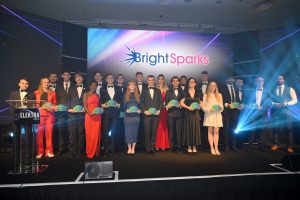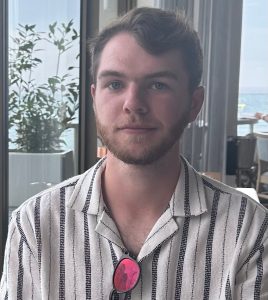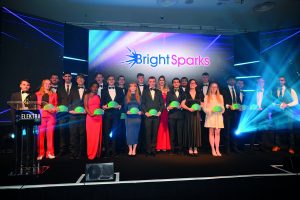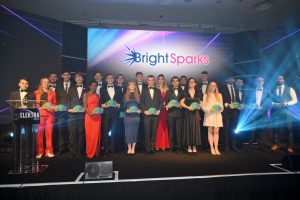Here, in our series on the latest EW BrightSparks of 2023, we highlight James Arnold, a student at the University of Nottingham.
Achievements
James told us he has always been interested in electronics and started studying it at school. At this young age he was able to successfully build an ultrasound-driven distance measurer using only breadboards, basic off the shelf components and a PIC chip, for which he taught himself assembly to program it. Due to the high frequency, sampling rates must be very quick in order to decode the time of flight of the signal meaning the code also had to be as optimised as possible.
Once he started at the University of Nottingham, studying electrical and electronic engineering, he obtained a scholarship from the UKESF with a placement at the company Chess Dynamics Ltd.
 During his time at university, he has been involved in a wide range of projects. In his first year, for example, he was able to help in the development of a self-driving, RC car system. This involved a lot of circuit design as well as software development for communicating between the Arduino’s for controlling the motor, and the Raspberry Pi for processing the image data. James was able to implement a line-following system using OpenCV to develop the detection algorithms. This was further used to allow the vehicle to process signs and identify shapes, allowing it to know when it had reached a stop sign, for example.
During his time at university, he has been involved in a wide range of projects. In his first year, for example, he was able to help in the development of a self-driving, RC car system. This involved a lot of circuit design as well as software development for communicating between the Arduino’s for controlling the motor, and the Raspberry Pi for processing the image data. James was able to implement a line-following system using OpenCV to develop the detection algorithms. This was further used to allow the vehicle to process signs and identify shapes, allowing it to know when it had reached a stop sign, for example.
The raw data from the image processing was encoded and sent to the Arduino, where he implemented a PID (proportional–integral–derivative) algorithm to allow for smooth driving across the course. An ultrasound sensor was implemented for self-parking capability, thanks to the knowledge he had learnt in his original school project!
In his third year at university, his project was based around a solar race car that was being developed by Nottingham University, James told us.
“I was very proud of the work that my group was able to achieve on this project as we were able to successfully transmit important CAN bus data from the car – such as speed, battery, co-ordinates, and irradiance – wirelessly to a chase car, where the data was processed by a MATLAB model running a genetic algorithm to optimise the race strategy. This would send data back via the LoRa RF link to the driver, where a Raspberry Pi powered display would show the driver the speed that they should aim to drive at to finish the race in the best time. Our solutions were judged at the end of the year by people in industry, where we achieved a third-place finish.”
“We faced many issues in this project, particularly with sourcing components due to the pandemic. My designed PCBs were unable to be manufactured for many months resulting in me having to prototype the circuitry, as well as having to build a CAN transceiver for the Raspberry Pi after delivery of a faulty component. Luckily everything had arrived by the end to make a clean solution. I enjoyed the opportunity to work on this project due to its focus on sustainability.”
The project was helping to promote sustainable racing, we learned. Furthermore, the technology and models created are highly transferrable to electric cars in the industry, where hopefully solar power can start to be more heavily integrated, James told us.
He also recently completed a year in industry at his sponsoring company Chess Dynamics after working two summers previously. He was proud to say that he was given electrical lead of a large upgrade project. This came with a lot of responsibility and added pressure, but he greatly enjoyed the experience and he was able to complete most of the design work before his placement ended. This included developing motor calculations, power budgets and PCB designs for high-speed communication in Altium.
Finally, he was also made technical lead of a revival project of an old system that consisted of an EOD with a thermal imaging camera, a TV camera, and a hand controller. James was able to successfully get the system up and running and was able to improve the existing design. The purpose of reviving this project was to demo it at careers fairs. As a student himself, he knew what would stand out and worked with the senior staff to develop an appealing, yet portable solution to take around the country.
Community
As part of his UKESF scholarship James has carried out outreach in every year of his study. This has involved, for example, going into his former secondary school and giving talks to students interested in engineering.
He had the chance to tell them about studying engineering and, more recently, what it was like as a career after completing his placement year. This was also an opportunity for him to promote the UKESF, he told us, as well as make them aware of other opportunities available for other disciplines, such as mechanical engineering, for example.
As part of that UKESF scholarship, James also got involved with the ‘Girls Into Electronics’ day hosted by the University of Nottingham. This was a great opportunity, he told us, to promote engineering at university and give the attendees a unique experience of what studying at university is like.
They were all given Arduino kits, and a guide, to experiment and interface with different sensors. James acted as a helper, guiding them through the coding exercises, as well as answering any of their questions about the exercise or engineering in general. It was positive to find they found the day interesting and that they were considering studying electronics at university.
At work, James was able to work on the aforementioned project that was to be used for careers fairs. He descibed it to us as a very advanced, yet fun and accessible system where students can control the platform and the cameras and also get to play around with a thermal imager. It also served the purpose of being taken into local schools to promote engineering.
Furthermore, during the summer, some students from a local school visited for work experience and James was given the opportunity to mentor them and give a taste of engineering. For example, he was able to show them what he was working on as well as get them involved with some practical PCB testing – probing RS422 signals and looking at them with a differential probe on an oscilloscope.
See also: Elektra Awards 2023 – The Winners
 Electronics Weekly Electronics Design & Components Tech News
Electronics Weekly Electronics Design & Components Tech News



